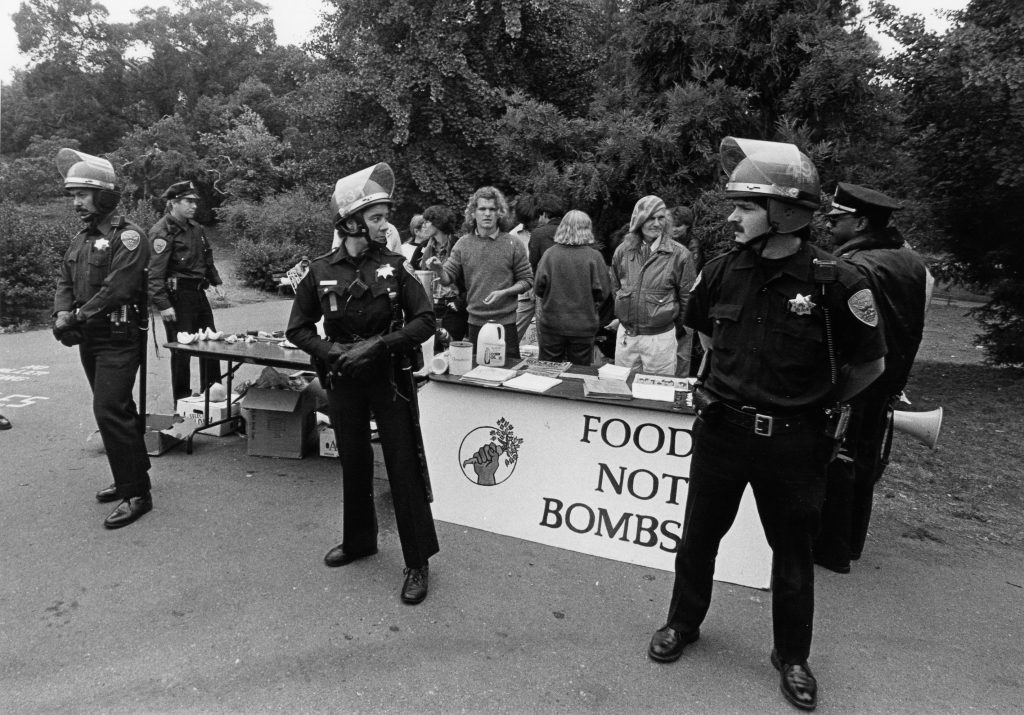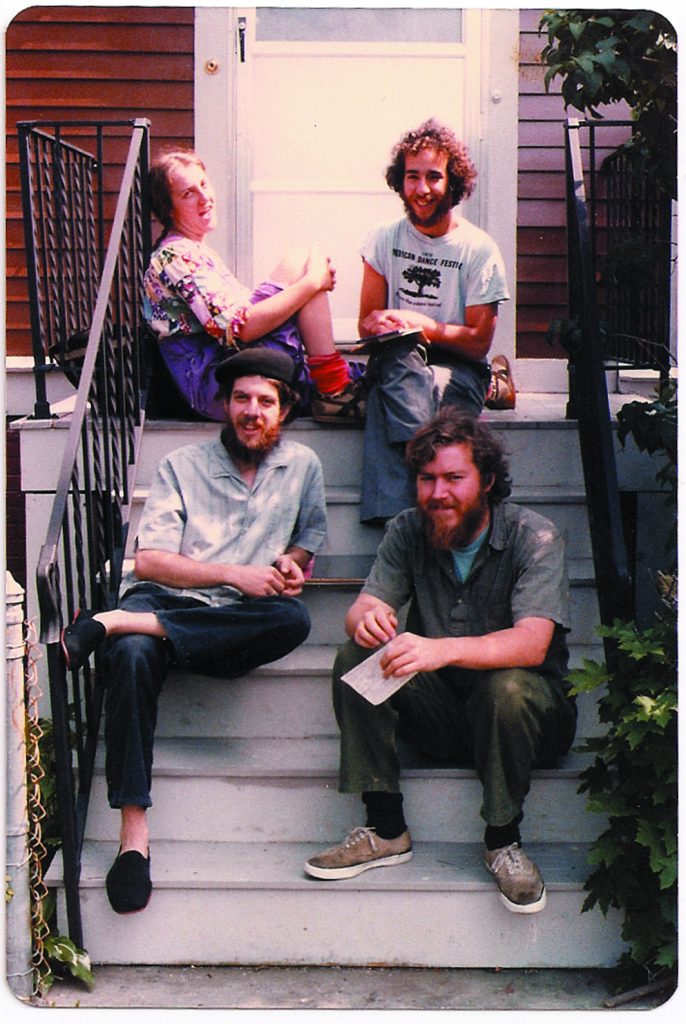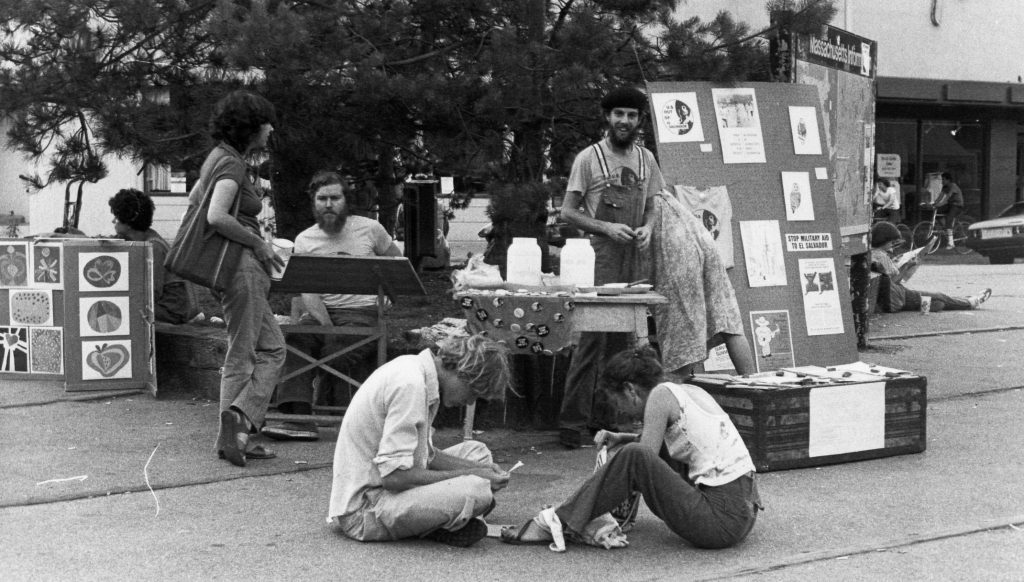
Food Not Bombs has been serving meals at People’s Park five days a week since 1991. And as the Park commemorates its 50th anniversary, Food Not Bombs is celebrating 39 years serving meals to the hungry. In honor of this shared anniversary, Food Not Bombs co-founder Keith McHenry shares his project’s origin story.
Food Not Bombs was founded in protest. It was a sunny May morning on the New Hampshire coast. Several thousand activists surrounded the Seabrook Nuclear Power Station construction site. The protesters planned to breach the construction site. They were clad in a collection of protective gear including helmets and handmade foam padding. The bitter sting of tear gas reddened the eyes of the activists.
Boston University law student Brian Feigenbaum was the spokesperson for the protesters. As they hooked ropes to the chain linked fence and pulled sections free, National Guard soldiers rushed towards the activists, batons swinging. Tear gas dropped from helicopters. Statetroopers pepper sprayed people in the face.
After several attempts to enter the site were violently repelled, the crowd blocked the entrance. Riot police arrested Feigenbaum on charges of assaulting a police officer—allegedly hitting patrolman with a grappling hook.
A few frantic phone calls later, an acquaintance paid Brian’s bail, but only after he promised he would repay the bail money. That evening on the drive to home to Boston, eight of us brainstormed how we were going to repay it. And that’s how, on May 24, 1980, the collective that became Food Not Bombs was born. The eight of us—Susan Eaton, Brian Feigenbaum, CT, Mira Brown, Jessie Constable, Amy Rothstien, Jo Swanson, and I—moved into a house together, and became inseparable after that night.
We called ourselves Brian’s defense committee, and we tried to raise money to repay the bail by holding bake sales. At the time, I was also trimming produce at a natural grocery store called Bread and Circus. One day, a skinny young man named Kriss Worthington—who would go on to become a Berkeley city councilmember—asked if we had any discarded food he could have to feed his housemates.
I did, but he couldn’t use it all. So I took the rest to people at the public housing on Boston’s Portland Avenue. The families I met we grateful and asked me to return, so I started to bring them my discarded produce. While visiting with the families our conversation turned to the new build- ing across the street. They told me that it was a laboratory that designed nu- clear weapons. That is when I coined the phrase Food Not Bombs.

Soon I learned that the board of directors at the Bank of Boston sat on the board of the Public Service Company, which was building the Seabrook Nuclear Station. I also found that these board members also sat on the boards of nuclear weapons manufacturers. So my housemates and I decided to protest by organizing a Depression Era soup-line outside their stockholders meeting. We planned to dress like we were homeless, and hand out flyers saying that the investment policies of the bank could lead to a future where people might have to stand in line to get a meal.
We made a beautiful soup out of the recovered food but we became concerned that we might be the only people attending the protest. I drove to the Pine Street Inn to invite those who were taking shelter there to join our action. The next day nearly everyone at the inn came to eat. Passing business people were shocked at the sight of a soup line. Those who made the inn their shelter encouraged us to do it every day, as there were no regular meals for those who lived outside.
My activism in support of those who lived outside in Boston finally caused me trouble in the fall of 1986. Local police and business leaders were starting an anti-homeless campaign of dehumanization. My wife, Andrea and I objected and organized a campaign of support. After a few months it became clear we had to disappear for our own safety.
A year later I was living in San Francisco, starting a second group sharing meals Monday’s at the entrance to Golden Gate Park. On August 15, 1988, riot police arrested nine of us for “sharing food without a permit”—a permit we had been requesting for weeks. During the next eight years, the San Francisco Police made nearly 1,000 arrests for feeding the hungry. These arrests inspired the formation of Food Not Bombs groups in cities all around the world.
It was during this time that East Bay Food Not Bombs started. They shared their meals at People’s Park. After the Gulf War in 1992 Judy Foster became active sharing meals on “Gourmet Tuesdays.” Photographer Lydia Gans joined her.
Gans was impressed by the volunteers because, she said, “everyone was dedicated to the community, and dedication is what we all believe in, which
is pretty unusual. Most people do things because they’re supposed to, but at Food Not Bombs no one tells another what they have to do.” Those impres- sive volunteers included Terri Compost, Joseph Liesner, Dave Weddingdress, Sharon Black, and Eli- sa Smith. Among those who ate at Food Not Bombs were members of the yet to be signed band Green Day and punk icon, Jeff Ott of Fifteen.
Food Not Bombs is still an all-volunteer movement that shares free vegan or vegetarian food with the public in over 1,000 cities in 65 countries. Each group is independent and invites everyone to participate in making decisions and encourages those who depend on the meals to help guide their local chapter. Another principle of Food Not Bombs is that we are not a charity. We are committed to the fact that food is a right and not a privilege.
Food Not Bombs is also dedicated to taking nonviolent direct action to change society so that no one is forced to stand in line to eat at a soup kitchen. During the past 39 years, our volunteers have demonstrated their dedication to nonviolent direct action in many creative ways. Activists have shared vegan meals with prisoners inside Filipino jails, fed units of the Burmese military in Yangon, and inspired the protests that removed the corrupt government of Iceland.

We are often the first to respond to natural disasters. Food Not Bombs has provided food and material relief to the survivors of the Loma Prieta Earthquake in San Francisco and Northridge Earthquake, Hurricanes Katrina and Sandy as well as Typhoon Yolanda, and the Christmas Tsunami. Food Not Bombs activists have also been recognized as Prisoners of Conscience by Amnesty International who has called for the unconditional release of our volunteers.
We also fed the Peace Camp at Masha Palestine, Camp Casey in Crawford, Texas, protests against Exercise Talisman Saber in Australia, WTO protests in Seattle, Genova, and Cancun, and Occupy camps in cities across the United States.
Anyone can start a local Food Not Bombs group. We provide information on how to participate on our website. Our book, “Hungry For Peace” can also be a helpful resource.
Food Not Bombs will be celebrating 39 years of feeding social movements and the hungry at the Soupstock Festival in Santa Cruz, California on Friday, May 24 2019.
Keith McHenry is the co-founder of the Food Not Bombs Movement.
